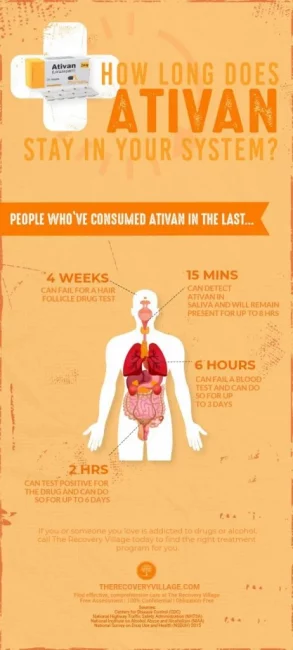Ativan and other benzodiazepines are habit-forming substances. It can take about 60 hours for the body to clear a dose of Ativan, depending on multiple factors.
Ativan is the brand name of lorazepam, a benzodiazepine drug prescribed primarily to treat anxiety. This overview covers how long it takes to leave a person’s system, howAtivanis used, its side effects and its potential for abuse and addiction.
Ativan’s Half-Life
The half-life of a drug is the amount of time it takes the body to remove half of a single dose from its system. Ativan’s half-life is about12 hours. Because it takesfive half-livesbefore a drug is removed from the body, it can take about 60 hours for the body to clear a dose of Ativan.
Additionally, Ativan is broken down into a metabolite by the liver. This breakdown product has a half-life of18 hours, meaning that it stays in the body for about 90 hours.
Combining Ativan with other drugs can change the half-life. For example, the gout medicine Probenecid canincrease the half-life of Ativan, while the asthma drug Theophylline canshortenit.
Treatment Can Be Life Changing. Reach out today.
Whether you are struggling with addiction, mental health or both, our expert team is here to guide you every step of the way. Don’t wait— reach out today to take the first step toward taking control of your life.
Factors that Influence How Long Lorazepam Stays in Your System
Several factors can impact how long Ativan stays in the body, including:
- Amount taken:The higher the Ativan dose, the longer it may take to leave the body. This is because it will take longer for the liver to clear.
- Frequency of use:The more often someone uses Ativan, the longer it may take for their body to clear the drug.
- Method of administration:Ativan is usually swallowed as a tablet or liquid, but it can also be injected. Although the drug has similar effects whether it is taken by mouth or via injection, a person’s body may clear the drug differently.
- Age:Older people generally clear Ativan about 20%more slowlythan younger people.

Ativan Drug Testing
There are several tests that can be administered to test for the presence of lorazepam. Ativan can show up on tests for different lengths of time, depending on what is being tested.
- Urine tests: Ativan shows up in urine abouttwo hoursafter use and can be found forthreetosixdays. Urine tests are the most common way to test for Ativan.
- Blood tests: Ativan levels start to peak in bloodone to six hoursafter use and may continue to show up in blood tests for several days.
- Hair tests: Ativan doesnot always show upin hair tests, and it tends to be at verylow concentrationswhen it does show up.
- Saliva tests: Ativan shows up in saliva about15 minutesafter use and can remain present for abouteight hours.
False positives for Ativan are also possible. A few prescription drugs are known to give false positives on Ativan and benzodiazepine drug tests, including:
- The HIV drugefavirenz
- The mood drugsertraline
The pain drugoxaprozin








